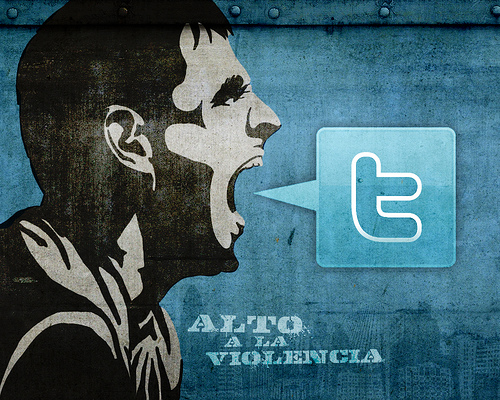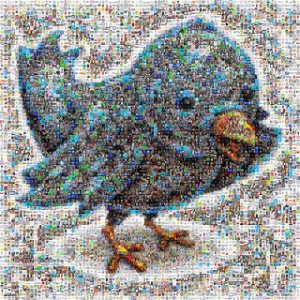This recent Businessweek article about the strategic purchasing options of Twitter has got me fuming, and it’s not just because I’m a Google guy.
Barry Ritholtz, a widely followed financial analyst and blogger, argues that Apple should buy Twitter, primarily because doing so would add the crucial social component that Apple still lacks, despite its growing dominance in personal electronics and entertainment.
I’ll be honest – there’s a large philosophical divide between the Apple and Google approaches to the digital age, and I now sit firmly with the search giant. But I adored my iPods and iPhones for years, and I continue to laud the company for its vision, innovation, and ability to bring technology so effectively to so many people.
No, my biggest problem with that article is the way Twitter is discussed. Is Twitter a cork to patch up the holes in a larger company? Is it a shiny feature to enhance an already successful product? What is Twitter to you?
To me it’s a platform for building communities, sharing ideas, and effecting change in the world around us. Twitter gives a voice to the ninety-nine percent, brings social purchasing power to those with a need, and serves as a global billboard for anyone – anyone – to say, “Look at me. What I think matters.”
Let’s not forget that Twitter (among many more examples):
- is used to rally global support for events like the 2009-2010 Iranian election protests (“Green Revolution”) and 2011 Egyptian revolution
- has been adopted by the Red Cross as a vital tool in disaster coverage and response for fires, earthquakes, terrorist attacks, and more
- is successful in raising public awareness of anything from cause-based fundraising to commercial products to network television events
And perhaps the most amazing thing about Twitter is that it evolves organically with its users in real time. During election campaigns, Twitter recruits you. During crises, Twitter informs and organizes you. During times of prosperity, Twitter markets and connects you. No one tells Twitter what to be – it is what we make of it in the moment.
Twitter is the pulse of the digital age.
I realize that in our economy, everything gets bought sooner or later. I particularly don’t want Apple – a company famous for its closed and authoritative approach to development – to own so free and fluid a thing as Twitter. But more than that, I am pained by the thought that any company might buy Twitter to shore up its “presence in the social software end of things.”
When Twitter is bought, let it go to a company whose philosophy complements its nature. Let it be free of a company with an agenda, rather let Twitter remain what it is: a reflection of who we are and what’s important to us at any given moment.
What does Twitter mean to you? Do you think Twitter should be bought?
Thanks to @DvinMSM for showing me this article. Comment and share to keep the discussion going. And subscribe via Email or RSS if you like this blog!


No comment yet
7 pings
Leave a reply
Ntruhan says:
March 26, 2012 at 8:47 am
Well said, I agree. While Apple products provide great access to even the ‘technology challenged’ of us out there, their current approach would be way too limiting for Twitter. It would be too sad to see.
Wade Burch says:
March 26, 2012 at 2:19 pm
I’m glad you feel that way, too. Thank you for reading!
Matches Malone says:
March 27, 2012 at 8:46 am
This article feels one sided, based on Google’s acquisition of FriendFeed, and giving us Google+ as a result, in an attempt to become the next Facebook. Why do you deny Apple the same opportunity?
Wade Burch says:
March 27, 2012 at 12:54 pm
For what it’s worth, I think Google should stop trying to become Facebook and instead work on better integration with and expansion of Facebook’s features. However:
FriendFeed was purchased by Facebook, not Google. Rather, Google adopted features similar to FriendFeed’s to make Google Buzz which led to Google+.
Facebook and Twitter are platforms for generating and sharing original social content. Google search and FriendFeed (which was founded by ex-Google employees) simply aggregate existing web and social content. This makes Facebook/Twitter and Google/FriendFeed complementary services.
Apple has no foot in either door. They have no way to generate content and nothing to aggregate. With that and Apple’s history of locking down its products (not sharing APIs; not allowing plug-ins, extensions, or modifications), I strongly believe its ownership of Twitter would be a grave disservice to the platform.
Matches Malone says:
March 28, 2012 at 8:07 am
Well then, I stand corrected. However, I still believe your argument to be weak. Past performance is sometimes not an indicator of future results.
What kind of company do you believe Apple to be, if they don’t have a foot in either door, as you say?
Wade Burch says:
March 28, 2012 at 1:41 pm
Before I start, I would actually like to hear your expanded point of view. I know what I think, and I know that you disagree, but I don’t know why. To answer your question:
I believe Apple to be a company more focused on providing a “tight,” polished, and monitored product that should be enjoyed as-is.
Whereas some people – including those more likely to have a strong online presence – appreciate the ability to customize and build upon products.
Since Twitter has many, many plugins and custom portals, and since its content is so collaborative and varied (some accounts exist just to tweet x-rated pictures, for goodness’ sake), I believe Twitter falls under the latter category. Example:
Apple mobile devices are beautiful, efficient, and simple with minimal options for actually changing anything. You can change the background and ringtone, but that’s about it. The contents of your phone are closed to you outside of including/excluding from iTunes. To build on the platform yourself, you must pay to join the developer program and use closed-source APIs.
Android mobile devices are a potluck of what Google designed and whatever bloatware your phone manufacturer adds. But you can change just about anything your heart desires through settings, widgets, and skins. There’s even a stock file explorer you can use without rooting or jail-breaking. To build on the platform yourself, you can access the open-source SDK at anytime and start scripting.
Think of all the third-party plugins we like to use in WordPress, an open-source blogging platform. Would Apple design something similar? Google has Blogger, but so far Apple has shown little interest in that arena, period. Even Yahoo tries to build a “social network,” importing your friends, linking your profiles, and signing you into a messenger when you sign in for email (which is actually annoying).
Where is Apple’s messenger? iMessage is iOS-compatible only – that doesn’t count. In fact, I can’t think of a single Apple product designed around sharing anything (and don’t say Ping – that’s a joke).
I see you were a Macintosh Lead Technician at JPL. I respect the market for Apple products – art, design, and efficiency greater than Windows could hope for. That said, I don’t think the company’s focus, unless it changes radically after the passing of Steve Jobs, is right for a company like Twitter.
Matches Malone says:
March 29, 2012 at 7:51 am
It’s a matter of substance and style. Most users, I would say probably 90%, don’t need the functionality you describe above, and as you know for the rest, “There’s an app for that…”
Put another way, I think Apple’s success is largely based on the fact that you feel is a weakness. Not just anyone can build something for it, there’s a process.
As for customizing the machine itself, the ability has existed until OS X, and most customization these days occurs on your browser of choice.